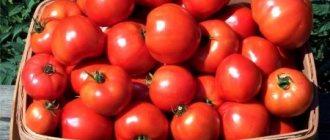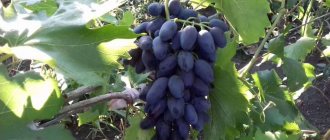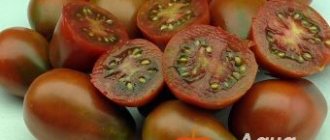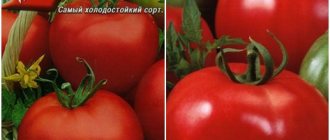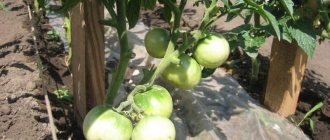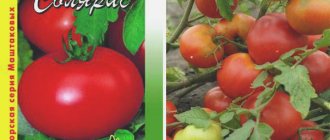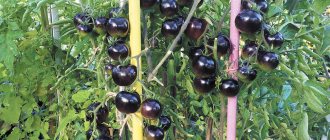Tomatoes and late blight - how to fight: the experience of summer residents
Fighting late blight fungus on tomatoes
Every gardener’s worst nightmare is late blight.
This is something we must fight tirelessly. But the summer residents, frightened by her truly brutal disposition, are ready to fight with her even when this is not required... Fear has big eyes.
Obsession with watering and mania for tearing off leaves
The past summer season turned out favorably for everyone’s favorite garden crop—tomatoes. Apparently, nature decided to pay back a kind of favor for the previous year (however, in our country, any summer without late blight is already good luck). And the same weather became an ally in the fight against this evil monster. Record low air humidity (sometimes it dropped to 20%) over a long period and high solar activity dried out late blight and its other relatives. For the first time in my memory, the leaves on tomatoes remained perfectly green literally until the end of August. Although some of my friends still managed to introduce this scourge into their garden.
And here I cannot help but say about the flexibility of gardeners in the fight against diseases. To protect tomatoes, I use biological fungicides and a growth regulator with fungicidal activity. But this set seems to be averaged - then you need to look at the weather. So, last year this kit was not able to cope with late blight on its own, and it was necessary to add some kind of systemic fungicide to it. Now, on the contrary, even biological products in the summer have turned out to be unnecessary. And some, especially zealous summer residents, continued to irrigate their tomato bushes generously with Bordeaux mixture in the heat, dripping with sweat. For what?
But the hot sun and dry air, having relieved some problems, immediately brought new ones. Fruit blossom end rot and sunburn were especially noticeable.
Rot appears due to uneven watering when there is a lack of calcium in the soil and an excess of potassium. Elongated fruits are particularly affected by this disease.
What can be done? First of all, in such weather it is necessary to increase the frequency of watering, as well as carry out regular root and foliar feeding of plants with calcium nitrate. Its one-time use will not give anything, so don’t be lazy, colleagues. And don’t forget about a balanced mineral diet.
But sunburn of fruits, which causes the appearance of unappetizing yellow or white spots and hardening of the skin of the fruit underneath, is caused by insufficiently dense foliage of tomato bushes in hot weather.
Our gardeners are infected with a downright manic obsession to quickly cut off all the leaves of tomatoes! Improper removal of them (at an early stage and in large quantities) generally has a negative effect on development. And in the heat... Exposure of fruits to direct sunlight plus general overheating in the greenhouse are the main enemies of obtaining quality tomatoes.
And in September another problem appeared: the fruits began to crack severely. This was due, first of all, to sharp changes in day and night temperatures, which sometimes exceeded 20°.
And due to the fact that watering (which can smooth out the problem) is not customary during this period, the phenomenon has become widespread. I was especially convinced of this through my own example. That bed with tomatoes, where the soil moisture at depth remained high and without watering, did not bear a single fruit with a crack. At the same time, in the same greenhouse, but on drier soil, cracking could not be avoided.
Features of cultivation and storage
Huge branched tomato bushes require sparse plantings. When planting in a checkerboard pattern, there should be at least 60 centimeters between plants, and planting in a row is carried out according to the 60x90 pattern. If a tomato grows in a greenhouse, you can leave it 2-3 branches; this will not negatively affect the yield.
A larger number of large tomatoes are concentrated in the middle part of the bush, so after the ovary of the main mass, the top is removed. This technique will allow the already set fruit to gain maximum weight and ripeness.
Tomatoes can be stored and ripened in wooden boxes. Keeping quality is low, it is better to process the crop.
Tomato varieties resistant to late blight
Late blight, also known as “brown rot,” is one of the most serious diseases that gardeners face when growing tomatoes. This disease affects all parts of the plant, including the fruit, so more and more people are choosing tomato varieties that are resistant to late blight. Basically, the tomatoes that are most resistant to late blight are hybrids. In this material we will analyze which varieties tolerate this disease best.
Are there tomatoes that don't get sick?
It should be noted right away that no tomato variety can be 100% resistant to late blight. However, there are indeed hybrid tomato varieties that are much more resistant to late blight than others. But this is only one of the options. The second option is that early ripening varieties are planted, which manage to produce a harvest before the outbreak of a general “epidemic”. After all, as you know, the development of this harmful fungus on plants is facilitated by hot, humid weather, which begins in late July - August. Therefore, many choose precisely those varieties that produce a harvest before this time. Now let's take a closer look at which tomato varieties are not so afraid of late blight.
Tomato varieties resistant to late blight
Among all the tomato varieties that are the most resistant to late blight, I would like o or “Dubrava”, as some gardeners also call them. It even happened that bushes of this variety remained completely healthy when others died from disease. De Barao Black tomatoes also have good immunity to late blight; often this variety does not get sick at all. Among the low-growing tomatoes resistant to late blight is about. These fruits ripen early, which is why they get sick less often than others. The Tsar Peter tomato variety is also beloved by gardeners because it is quite rarely susceptible to this disease, despite the fact that it is considered mid-season. Among the cold-tolerant tomato varieties that are resistant to late blight, it is necessary to o. Despite the fact that they ripen quite late, they are rarely susceptible to disease due to this fungus. This section contains only those varieties from which you can get seeds for planting next year or, more simply, non-hybrid ones. The next section will be entirely devoted to tomato varieties artificially cultivated by agronomists. It must immediately be said that these varieties were originally bred as resistant to this disease, so they are less susceptible to late blight than those presented above.
Hybrid varieties
Which tomatoes are not as susceptible to late blight as others? Well, of course, hybrid! After all, when breeding them, they took this disease into account, bringing to the ideal what Mother Nature once created. Let's start with the Soyuz 8 F1 variety; it is very resistant to this nasty fungus and a number of other diseases, which makes it stand out among many. The next variety that I would like to mention is “La-la-fa F1”. These tomatoes resist late blight quite well. In addition, they are not susceptible to another dangerous tomato disease -
top rot. The variety “Lark F1” deserves special attention. These tomatoes, in addition to their resistance to this disease, also ripen very early, leaving late blight no chance. But, as you know, if late blight did not attack the plant during growth, this does not mean that the fruits will not suffer during storage. One of the varieties whose fruits are not susceptible to this disease during long-term storage is “New Year's F1”.
But, whatever one may say, even these varieties sometimes get sick, so the only effective protection of your crop from this disease is timely treatment with fungicides. Combined with planting varieties resistant to late blight, it gives a high chance of a large and healthy harvest.
womanadvice.ru
On October 9, 1975, Andrei Sakharov became the first Nobel Peace Prize winner in Russian history.
Andrey Sakharov. 1989 © / Dmitry Donskoy / RIA Novosti
The Nobel Peace Prize has been the subject of heated debate in recent years. Many are convinced that its laureates have recently become people and organizations that discredit this high award. The talk of the town was the award in 2009 to US President Barack Obama, who in subsequent years devoted more time to fomenting new armed conflicts than to the cause of peace.
However, this Nobel award has always caused controversy because of its politicization and short-term nature. The names of most of its laureates will say little to subsequent generations or will raise serious questions.
Nobel Peace Prize. The most worthy and scandalous laureates
To this day, debate continues over how justified the award of the Nobel Peace Prize in 1990 to the first and last president of the USSR, Mikhail Gorbachev .
But in Russian history there was another Nobel Peace Prize laureate, who received it 15 years earlier - Soviet physicist and human rights activist Andrei Dmitrievich Sakharov . And this award, like the identity of the laureate, looks no less controversial.
Description and characteristics of the variety
The tomato is an indeterminate type, very tall, 2-2.5 meters in height. The first fruits ripen 120-125 days after sowing. The leaves are light green, medium size, regular shape. The stems are relatively thin and need staking. The bush allows the formation of 1-3 stems.
The stalk has a weakly defined “knee”, so tomatoes are cut with scissors. If you pick it, you can damage the plant and cause infection.
The brushes are simple and intermediate, alternating vertically. Each cluster bears 4 to 8 fruits. The tomatoes are round, slightly flattened, with slight ribbing at the stalk. The color of the fruits is red or red-pink, they are multi-chambered, with an average seed content. The pulp is fleshy, red-pink, tender. The taste is sweet, tomato, without sourness.
“Dad made me a physicist”
Young Andryusha Sakharov, born in 1921, has problems finding an answer to the question “Who should I be?” did not have. The answer to this question was given by his father, Dmitry Ivanovich Sakharov , a physics teacher, popularizer of science, author of a textbook from which several generations studied.
As Sakharov Jr. himself said, “Dad made me a physicist, otherwise God knows where I would have gone!”
Andrei Sakharov received his primary education at home, and when he came to school in the seventh grade, he was already clearly moving along the scientific path. After graduating from school in 1938, he entered the physics department of Moscow State University, and in 1944, he entered graduate school at the Physical Institute of the Academy of Sciences, where future Nobel laureate Igor Tamm became his supervisor.
Already at that time, Andrei Sakharov was considered one of the most promising physicists in the country, and it is not surprising that he soon became one of those tasked with creating the country’s “nuclear shield”.
Academician Andrei Dmitrievich Sakharov at his dacha in Zhukovka. 1972 Photo: RIA Novosti
Since 1948, Sakharov worked for twenty years on the creation of Soviet thermonuclear weapons, in particular, he designed the first Soviet hydrogen bomb.
About how successful Sakharov was on this path is evidenced by three stars of the Hero of Socialist Labor, the Order of Lenin, one Stalin and one Lenin Prize, numerous scientific regalia and other benefits that the Soviet state generously showered him with.
Advantages and disadvantages
Pros:
- bears fruit throughout the season;
- high yield of the variety;
- high immunity to the most dangerous nightshade diseases;
- friendly ripening of fruits on the cluster;
- excellent taste;
- You can get seeds from your tomatoes.
Minuses:
- quite long ripening;
- does not have time to fully bear fruit in open ground where the summer is short and unstable;
- Quite difficult to care for.
- Sometimes tomatoes crack.
From nuclear tsunami to the fight for peace
The enthusiasm of young Sakharov amazed even the military. Thus, his ideas about using super-powerful nuclear charges to carry out underwater explosions, causing a giant tsunami capable of washing away all cities on the US coast, seemed excessive even to Soviet generals and admirals who were not prone to sentimentality.
However, in the 1960s, something happened to Sakharov that had previously happened to many other nuclear physicists both in the USSR and in the USA - he comes to the conclusion that his activities are immoral and blasphemous, and decides to devote himself to the fight for peace. disarmament and a just world order.
In the mid-1960s, Sakharov's social activities began to supplant scientific ones. He writes letters against “Lysenkoism”, against the rehabilitation of Stalinism, in defense of writers and public figures who came into conflict with the Soviet regime due to political differences.
Phytophthora-resistant varieties for the Moscow region
There are several types of blight-resistant tomatoes, which are best planted in the Moscow region.
Alsou
The earliest tomato for the Moscow region is Alsou. The entire crop has time to ripen within one hundred days after planting in the soil. The main advantages of Alsou are considered immunity from diseases and rapid ripening of fruits.
Arctic rose
The Arctic rose is suitable for planting in open ground in the Moscow region, as it tolerates minor night frosts. Tomato bushes are very compact, and therefore 5-7 plants fit per square meter of land.
See also
How to prepare the soil in a greenhouse for tomatoes in the spring and what to treat before planting
Read
Lark F1
This Transnistrian variety is ideal for planting in the Moscow region. Its characteristic features include:
- resistance to drought and low temperatures;
- fruit juiciness;
- short harvest ripening times.
Juggler F1
Juggler is considered the newest hybrid variety that rarely suffers from late blight and other pathologies caused by the fungus. The plant grows well in open ground and in greenhouses. The Juggler's yield is 5-6 kilograms of vegetables per bush.
Far North
A low-growing plant that does not grow higher than 45 centimeters even in optimal conditions. The fruits of the Far North have dense and sweetish pulp. They are also juicy, which is why housewives often make tomato juice from them.
Sanka
Many farmers value this tomato for its ease of care and high yield. Sanka is not afraid of temperature changes, and therefore can be planted in vegetable gardens in the Moscow region. Ripe fruits have excellent commercial qualities, which are preserved even after long-term storage.
Ultra early ripening
From the name it becomes clear that the main advantage of the variety is the speed of harvest ripening. Ripe tomatoes can be harvested a month and a half after planting. It is better to grow ultra early ripening tomatoes outside.
Adherent of planned economy
In 1968, Andrei Sakharov wrote a policy article “Reflections on progress, peaceful coexistence and intellectual freedom.” In it, he examined global problems threatening humanity and put forward the thesis of “the rapprochement of the socialist and capitalist systems, accompanied by democratization, demilitarization, social and scientific and technological progress, as the only alternative to the destruction of humanity.”
Already in this article, Sakharov’s main shortcoming as a public figure was revealed - his ideas and thoughts looked extremely divorced from reality, from the realities of real life.
At the same time, for those who know about Sakharov’s activities only by hearsay, some of the postulates of this article may be very surprising: for example, the academician believed that a socialist society in sociocultural terms is a step above capitalism, and a planned economy is superior to the market in its potential.
Of course, the article also contained criticism of the Soviet system - the only system that, in fact, Sakharov knew personally.
Three times Hero of Socialist Labor, an atomic scientist who scolds the Soviet regime - in the West, Sakharov’s person was immediately and firmly grasped. He promised to become an excellent weapon in anti-Soviet propaganda.
On the other hand, the Soviet state security authorities took the academician-social activist “on their pencil” as a potentially dangerous person.
Academician Andrei Dmitrievich Sakharov at the Congress of People's Deputies of the USSR (May - June 1989). Exhibition Fund. Photo: RIA Novosti / Sergey Guneev
Tomato variety Academician Sakharov, video
If you grew Akademik Sakharov tomatoes, please write whether you liked them or not. What was the yield and taste of the fruits like under your climatic conditions? Briefly describe the advantages and disadvantages of this tomato in your opinion. If possible, attach to the comment a photo of the entire bush as a whole or individual fruits that you grew.
For other interesting varieties with photos, descriptions and reviews, see our Tomato Catalog alphabetically. Enjoy watching!
Your reviews of the Academician Sakharov tomato and additions to the description will help many gardeners evaluate this variety objectively and decide whether it is worth planting or not.
This is a natural variety of tomato. Therefore, we recommend taking seeds from a ripe fruit and using them for planting in subsequent seasons.
The king is played by his retinue
It is likely that the Sakharov who is known today would not have existed if two fatal circumstances had not happened - the death of the academician’s first wife and his acquaintance with the dissident Elena Bonner .
In order not to be unfounded, we will quote from the diary of the academician himself: “Lucy (Bonner - editor's note) told me (the academician) a lot that I would not have understood or done otherwise. She is a great organizer, she is my brain and “think tank”, who married Sakharov in 1972, finally turned the academician away from science towards human rights activities.
Bonner's influence on Sakharov is becoming stronger. If in the early years of his public activity he criticized only individual shortcomings of the Soviet system, then the further he went, the more he began to contrast the gloomy totalitarianism of the socialist camp with the pure democracy of the capitalist world.
The more harshly Sakharov spoke, the more attention he received from both the Western and Soviet press. But if in the West the Soviet academician was presented as a fighter against the horrors of the Soviet regime, then in the USSR - as a real scoundrel, throwing mud at the Motherland, which gave him everything.
Both sides mixed a vigorous cocktail of grains of truth and a stream of propaganda.
Be that as it may, Academician Sakharov becomes a person known throughout the world.
"For freedom of thought." Who was awarded the Sakharov Prize by the European Parliament?
In the beginning there was Sakharov...
The authorities did not resort to punitive measures against Sakharov; they were mostly dealt with by his comrades in the dissident movement. The academician was closely monitored by KGB officers, and he was strongly advised not to irritate senior Soviet leaders.
The enraged academician, however, did not listen, giving regular press conferences for Western journalists working in the USSR.
Today people don’t really like to remember what the academician said at these press conferences. This is explained simply - when Sakharov left conversations on the topic “for everything good against everything bad” to discuss current events, his assessments turned out to be extremely controversial. And over the years it turned out to be wrong.
When Armenian nationalists carried out a terrorist attack in the Moscow metro in January 1977, Sakharov said: “I cannot get rid of the feeling that the explosion in the Moscow metro and the tragic death of people is a new and most dangerous provocation of the repressive authorities in recent years. It was this feeling and the associated fears that this provocation could lead to changes in the entire internal climate of the country that was the motivating reason for writing this article. I would be very glad if my thoughts turned out to be wrong..."
Academician Andrei Dmitrievich Sakharov (right) at an authorized rally in Luzhniki during the First Congress of People's Deputies of the USSR. Photo: RIA Novosti / Igor Mikhalev
Does this remind you of anything, dear readers? Twenty years later, the version about the involvement of Russian special services in the explosions in Moscow, and then about the involvement of the Belarusian special services in the explosions in Minsk, will be built on the same basis.
For his statement, Sakharov received a summons to the prosecutor's office, where he was given an official warning: “Citizen A. D. Sakharov is warned that he made a deliberately false slanderous statement, which claims that the explosion in the Moscow metro is a provocation of the authorities aimed at against so-called dissidents. Gr. Sakharov is warned that if he continues and repeats his criminal actions, he will be held accountable in accordance with the laws in force in the country.”
Sakharov refused to sign the warning notice, saying: “I refuse to sign this document. I must first clarify what you said regarding my last statement. It does not directly accuse the KGB of organizing an explosion in the Moscow metro, but I express certain concerns (the feelings I have written). I also express in it the hope that this was not a crime sanctioned from above. But I am aware of the acute nature of my statement and do not repent of it. In acute situations, sharp remedies are needed. If, as a result of my statement, an objective investigation is carried out and the true culprits are found, and the innocent are not harmed, if provocation against dissidents is not carried out, I will feel great satisfaction.”
People's Deputy of the USSR Academician Andrei Sakharov (left) with his wife Elena Bonner (right). 1989 Photo: RIA Novosti / Vladimir Fedorenko
Prize and tea and cake
But let's go back to the early 1970s. By 1975, Andrei Sakharov had transformed from a secret nuclear scientist into a world-famous person who was nominated for the Nobel Peace Prize by various public groups in the West.
Sakharov was an extremely convenient figure for the Nobel Committee - a famous nuclear physicist who repented of creating what brought him fame and honor, and who fought for peace and freedom, regardless of personal benefits. Such a portrait fit perfectly into the essence of the prize conceived by Alfred Nobel. Of course, Western politicians contributed in every possible way to this decision, for whom such a laureate was an excellent assistant in the ideological struggle against the USSR.
The Soviet Union, of course, was not too happy, but had no real leverage over the Nobel Committee. In addition, the detente of the 1970s was still in the yard, Moscow received the right to host the Olympics, and the Soviet leaders were not going to seriously quarrel with the West over Sakharov.
On the day that the prize was awarded to Sakharov in Oslo, his wife Elena Bonner was in Italy, where she was receiving treatment for her eyesight. The dissident academician himself was at that moment visiting friends in the human rights movement, drinking tea and apple pie. Soon, Sakharov’s associates, as well as Western journalists, arrived there. This warm company celebrated the award to the academician.
Untimely thoughts
Sakharov did not go to the award ceremony itself, but the intrigues of the KGB, by and large, had nothing to do with it. The academician was “restricted to travel” due to the fact that he was the bearer of too many defense secrets. By the way, according to Elena Bonner, Sakharov himself admitted this and did not particularly complain.
The award for Sakharov was received by his wife, who safely traveled from Italy to Norway with the text of Sakharov’s traditional “Nobel lecture” in her pocket, which she read out in Oslo.
In this lecture, in addition to the expected criticism of the Soviet regime, some fair, some not, there are extremely topical words:
“In an effort to protect the rights of people, we must act, in my opinion, first of all as defenders of the innocent victims of the regimes existing in different countries, without demanding crushing and total condemnation of these regimes. We need reforms, not revolutions. What is needed is a flexible, pluralistic and tolerant society that embodies the spirit of inquiry, discussion and free, non-dogmatic use of the achievements of all social systems."
Neither Libya, nor Syria, nor the Kiev “Euromaidan” fit into these naive ideas of Sakharov... Perhaps today the academician would not be awarded a prize for such speeches.
Academician Andrei Dmitrievich Sakharov (center) during his return from Gorky to Moscow. 1986 Photo: RIA Novosti / Yuri Abramochkin
When patience runs out
After receiving the award, Elena Bonner safely returned to her husband in the USSR, where the couple began to fight the Soviet system with even greater energy.
I am not inclined to consider the authorities of the Soviet Union prone to humanism, but the fact is that harsh measures were taken against Sakharov only in 1980, when he openly opposed the introduction of Soviet troops into Afghanistan.
Probably, the annoying academician could have been expelled from the USSR earlier, like Solzhenitsyn and Rostropovich, but everything again came down to “nuclear secrets” - he knew too much.
But in 1980, détente gave way to a long life, the warring parties again switched to harsh rhetoric, and in these conditions they no longer stood on ceremony with Sakharov - they deprived him of Hero’s stars, orders and other regalia, and sent him into exile in Gorky.
For these sufferings, the Nobel Committee would be happy to give Sakharov another Peace Prize, but, according to its status, the award is awarded only once...
aif.ru
For open ground
Breeders have developed hybrids for growing outdoors that are practically not affected by fungal diseases. Among them, there are seven varieties that grow better than others in open ground.
Anyuta F1
Anyuta is considered the most popular ultra-early tomato, which is protected from late blight and frost. The first ripe fruits of the vegetable appear on the bushes a month and a half after planting in the soil. The main advantages of Anyuta:
- excellent taste characteristics;
- rapid ripening;
- compactness of bushes;
- transportability.
Betta
Betta is considered a stamped type of tomato with early ripening fruits that can be harvested after three months. The harvested crop is great for pickling and creating vegetable dishes.
Oak
This variety was bred at the beginning of the two thousandth specifically for planting in open ground. Currently, Dubok is popular among gardeners due to its immunity to late blight. Dubka has small tomatoes with a flattened shape. They have a pleasant, aromatic taste with slight sourness.
Lazy
The largest harvest can be harvested precisely when growing Lazy. The average weight of ripe fruits is 450 grams. Ripe, fleshy tomatoes are used in cooking to create tomato paste, sauces, salads and pickles.
Perseus
A popular Moldovan tomato that is resistant to temperature changes, late blight and pest attacks. Perseus has large tomatoes that weigh 200-300 grams. The fruits have little dry matter and therefore tomato juice and ketchup are often prepared from them.
Tsar Peter
Tsar Peter is grown both on the street and in small film greenhouses. At the same time, in greenhouses the harvest will ripen in 85-90 days, and in the garden - in 100-115 days. Tsar Peter is considered a universal vegetable that can be used for canning, pickling and pickling.
Anniversary Tarasenko
This variety cannot be used in small greenhouses, since the height of its bushes reaches three meters. Therefore, experienced gardeners advise planting Jubilee Tarasenko on the street. The advantages include:
- long-term storage;
- immunity to fungi;
- frost resistance.
In 1975, Academician Sakharov received the Nobel Peace Prize.
Bobik
Good move. This all speaks of political standards according to the PROTOCOLS OF THE ELDERDS OF ZION.
Marmots - for modernization (off. page)
Fine…. The whole world is built on theses and antitheses. . Learn dialectics... By the way. truth. for the sake of the Noble Peace Prize - has nothing to do with the Nobel Prize. . General - name only
Han
Of course it's fine. Look who else received this award: Obama - Gorbachev who started the war - who destroyed the USSR Some of the Jewish leaders for bombing the Palestinians, etc.
So draw your own conclusions about why this award exists.
Dmitry Gladky
The prize was not given for the bomb.
D.Ch.
"For his fearless support of the fundamental principles of peace among men and his courageous struggle against the abuse of power and all forms of suppression of human dignity." Often, the awarding of the Nobel Prize to immigrants from Russia was of a purely political, anti-Russian or anti-Soviet nature.
Anton Belov
what did Obama get you okay? he makes full use of the invention of the first and threatens with the invention of the second.
Tyrannosaurus 4
And terrorists received the Nobel Peace Prize. So what?
Who is Academician Sakharov******????
Irina I
Father of the hydrogen bomb, human rights activist.
Kenny
SAKHAROV Andrey Dmitrievich
1921 - 1989 Outstanding physicist, academician of the USSR Academy of Sciences, ardent human rights activist. One of the creators of the hydrogen bomb in the USSR. He advocated stopping nuclear weapons testing. Since the late 60s, one of the leaders of the human rights movement. In his work “Reflections on Progress, Peaceful Coexistence and Intellectual Freedom,” he spoke about the threats to humanity associated with the confrontation between socialism and capitalism. He was removed from secret work, deprived of all awards and exiled to Gorky (Nizhny Novgorod). In 1989 he was elected people's deputy of the USSR. Nobel Peace Prize (1975).
Irina Semenskaya
Andrei Dmitrievich Sakharov (May 21, 1921, Moscow - December 14, 1989, Moscow) - Soviet physicist, academician of the USSR Academy of Sciences and political figure, dissident and human rights activist, one of the creators of the Soviet hydrogen bomb. Winner of the Nobel Peace Prize for 1975.
“Thirty years ago, academician Andrei Sakharov tried to predict the future of humanity” (Sergei NEKHAMKIN) On May 17, 1974, Andrei Sakharov completed the article “The World in Half a Century.” It was written at the request of the American magazine Saturday Review. The dissident opposition of the “father of the hydrogen bomb” to the Soviet system was admired, but the question arose - what in return? In The World in Half a Century, Sakharov explained this. He didn’t just think about the prospects of scientific and technological progress, he outlined his vision of the structure of the world. “In 50 years,” he wrote, “I envision the creation of a world information system (WIS), which will make the content of any book, any article, obtaining any certificate available to everyone at any moment (...) All barriers to the exchange of information between countries and people will disappear " Only 30 years have passed - and the World Wide Web, the Internet, exists. This prediction of Sakharov came true.
Shishkanov Yuri
Actually, this is David Zuckerman. . this was later, for the purpose of secrecy, they assigned him a Russified version..
Tomcat
a hypocrite and lackey, as befits his nation.
Poli
Russian nuclear physicist, public figure, human rights activist. Andrei Dmitrievich Sakharov was born on May 21, 1921 in Moscow, in the family of a physics teacher. “Andrei Sakharov’s grandfather, Ivan Nikolaevich Sakharov (he was the tenth child in the family and the only one who received a higher education), was a famous Moscow lawyer, a member of the Committee of the Society for Assistance to Needy Students of Moscow University, a member of the Moscow Literacy Society, the Commission on the Introduction of Universal Education in Russia, secretary Commission for the organization of rural libraries. Andrei Sakharov's great-grandfather, Nikolai Ivanovich Sakharov, was a priest in Arzamas and an honorary citizen of Nizhny Novgorod. His ancestors were also priests for two more generations. (“D. I. Sakharov. 1889–1961. Biobibliographic index”)
wise Innocent
At first he was a scientist. Then a disorder occurred in my head and I began to speak out against the authorities.
I love to jam to the accordion!
Quite a dull personality. First he made a hydrogen bomb (using drawings stolen from the Americans), then... type. Let's apologize, he's ashamed! Well, the foreign machinations of imperialism immediately raised him to the shield - they made a dissident out of him! Who the hell needs him! this, you know, is like a defector intelligence officer, the country entrusted him with secrets, and he lets cormorants all over the world...
Nick Nicholson
Nobel Peace Prize laureates: A. Sakharov, M. Gorbachev, B. Obama. Apparently everything is from the conservatory...
